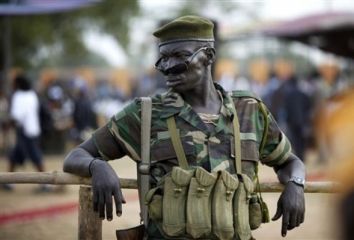UN condemns S. Sudan’s expulsion of its human rights investigator
November 4, 2012 (JUBA) – The United Nations Mission in South Sudan (UNMISS) on Sunday described as a “breach of legal obligations” the country’s decision to expel its human rights officer who carried out investigations into human rights situations in the young nation.

Her expulsion, according to sources, could be linked to a UN report published in August, which accused the South Sudan army (SPLA) of incidents of torture, rape, killings and abducting civilians during the civilian disarmament campaign in South Sudan’s Jonglei State.
Hilde Johnson, the head of the UNMISS has condemned the move, which she said violates South Sudan’s legal obligation to the world body.
“The order is in breach of the legal obligations of the Government of the Republic of South Sudan under the Charter of the United Nations,” said Johnson.
“Human rights monitoring, investigation and reporting, and building capacity, is a core element of the mandate of UNMISS which must be protected,” she added.
Johnson, in a statement extended to Sudan Tribune, further said it was important for authorities to allow the mission’s human rights officer to carry out their mandate, and urged government to bring to attention any serious complaints or evidence related to individual staff members’ conduct.
South Sudanese officials were unavailable for a comment over the matter. Meanwhile, the expelled UN official has reportedly been redeployed to the regional service centre in Entebbe, pending a decision on her future status.
In recent months, similar reports from Amnesty International and locally-based civil human rights group in the country have accused South Sudan’s security forces of human rights violations in the country, allegations the government has repeatedly denied.
2011 attack on UN human rights investigator
In August 2011 the former head of the United Nations human rights division in South Sudan, Benedict Sannoh, was badly beaten and taken from his hotel room by 10 South Sudanese police officers. The police left the UN official at a hospital after he was beaten, kicked and punched him while he was “in a sustained fashion while he was in a fetal position on the floor” the UN said at the time.
The August 20 attack occurred after Sannoh refused to allow police to search his bags and enter his room at his hotel in Juba, South Sudan’s capital. His injuries were so serious that he spent five days in hospital before being sent abroad for further treatment.
A statement from the Office of the High Commissioner for Human Rights in August 2011 described the incident as “totally unacceptable”, warning that, “Unless those responsible are held to account, this will send a chilling message to all those working in the defense of human rights in South Sudan.”
Attacks on civil society
In the last five months two members of the South Sudan Civil Society Alliance (SSCSA) have been kidnapped by unidentified armed men, suspected by activists to be elements of the security services, and badly beaten and questioned about their work.
The chairperson of the alliance, Deng Athuai Mawiir Rehan, said in October that his organisations treatment was “unbearable” and has called on the government to launch an “immediate investigation into harassment and targeted kidnapping of human and civil rights defenders”.
“The intention is very clear. They just want to muzzle the alliance which will not work. Our government must investigate and take actions”, Athuai told reporters on Sunday.
Ring Bulabuk, a defense lawyer who works with the alliance was kidnapped on 22 October in Juba by unknown armed personnel in civilian clothes. Relatives and friends say the men were members of South Sudan’s security services.
Bulabek was later found abandoned at Juba graveyard in “a terrible shape”, Athuai said, after being kept in an “undisclosed location” with no access to legal assistance and medical care until when he was found on Friday 26 October.
“There are people who do not understand what roles we play in the society. They see members of the alliance as threat. They do not see civil society as mirror through which people sees themselves”, he said.
Despite, serious human rights issues, Athuai said that he believed South Sudan’s leaders were striving to promote the supremacy of rule law, good governance, as well as improving transparency and accountability.
The the two abductions and beatings highlight the challenges facing South Sudan, which became the world’s youngest nation when it seceded from neigbouring Sudan in July 2011 after two decades of civil war.
(ST)
